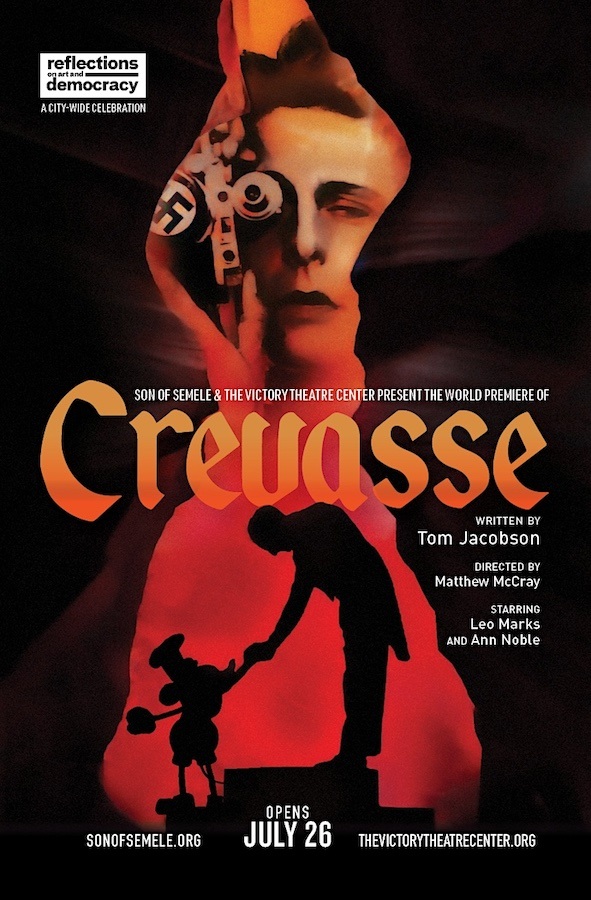By Robert St. Martin
Victory Theatre, Burbank, California (The Hollywood Times) 07/30/2024
Friday, July 26 was the opening night of Tom Jacobson’s fine play Cervasse at the Victory Theatre in Burbank. This new play co-sponsored by Son of Semele and Victory Theatre investigates the relationship between art and artists in Nazi Germany with the rise of fascism and massive antisemitism. Directed by Matthew McCray, Cervasse looks in depth at the visit paid to Hollywood in 1938 by German filmmaker Leni Riefenstahl where she sought American distribution for her award-winning film, Olympia, her documentary about the 1936 Olympics held in Berlin.” Arriving in Los Angeles, Riefenstahl discovered that none of the studio heads in the film industry would meet with her, except for Walt Disney.
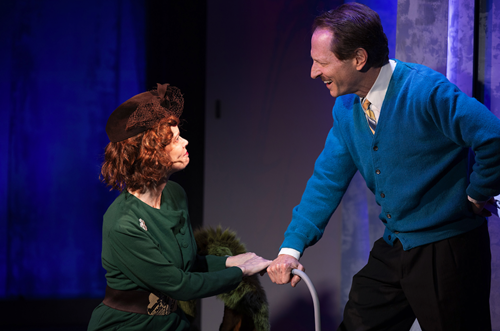
Ann Noble and Leo Marks star in an astonishing true story of betrayal, Nazi propaganda and animated cartoons. Playwright Tom Jacobson spins a what-might-have-happened tale around the 1938 meeting between two enigmatic public figures: Leni Riefenstahl, the brilliant German filmmaker who dedicated her talents to glorifying Hitler and the Third Reich, and Walt Disney, the creator of Mickey Mouse and a rather saccharine vision of American values. Cervasse is not intended to be a historical account of the meeting but rather an attempt to show the struggle between good and evil.
Leni Riefenstahl, born in Berlin in 1902, rose to prominence as a dancer and actress in the 1920s in Weimar Germany. She found screen stardom as the daring, lithe outdoorswoman in Arnold Fanck’s “mountain films,” a high-altitude genre with lots of ice and snow, with characteristically German “sturm und drang.” Tired of working with Fanck in mountain scenes with avalanches including Mountain of Destiny, she directed herself in The Blue Light (1932). In 1933, Reifenstahl caught the eye of Adolf Hitler: Rumors were that he had a crush on her from seeing the Fanck-G.W. Pabst collaboration, The White Hell of Pitz Palu (1929). Despite her relative inexperience and her gender, Hitler awarded Reifenstahl the plum assignment of making the official documentary record of the 1934 Nazi Party rally at Nuremburg in Triumph of the Will. Later she was chosen by Joseph Goebels, Minister of Propaganda to chronicle the 1936 Olympics in Berlin.
When Riefenstahl visited the States in 1938, she was searching for a distribution deal for Olympia, a documentary about the 1936 Olympics held in Berlin. The film included, among other events, the triumph of Black American Jesse Owens, who came away with four gold medals in track. Riefenstahl hoped that the less definitively political nature of Olympia – i.e., its focus on athletics – would help open doors otherwise closed to her because of her reputation as a maker of the Nazi propaganda film, Triumph of the Will, as well as the persistent rumors that she was Hitler’s lover.
But Riefenstahl was disappointed. By the time she landed in Hollywood, the Hollywood Anti-Nazi League had already mobilized, with a full-page ad in the Hollywood Reporter decrying her visit – which fell a couple of weeks after Kristallnacht – and exhorting producers to shut their doors – which they did. things seem to be going well for Leni (Ann Noble) upon her arrival, her film critic/publicist friend Ernst Jaeger (also played by Leo Marks) having secured her a dozen appointments with such Hollywood moguls as MGM’s Louis B. Mayer, Warner Brothers’ Jack L. Warner, and 20th Century Fox’s Darryl F. Zanuck.
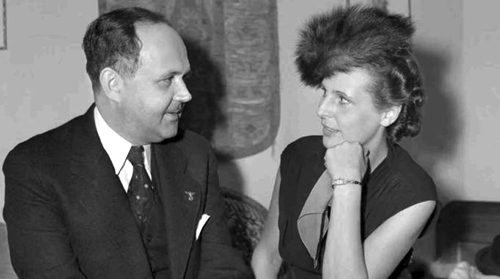
The only studio Riefenstahl was able to visit was that of Walt Disney, who, far from the powerhouse we know it as today, was a struggling entity, partly due to the loss in revenue suffered because of the war in Europe. Disney himself was not yet the patriarch whose grandpa visage greeted the young fans of The Mickey Mouse Club every weekday in the 1950s. Instead, he was a youngish apolitical man wholly invested in his craft with his animated films Snow White, Pinocchio, and Bambi. The fierce anti-communist and union-buster that Disney later became had not yet emerged.
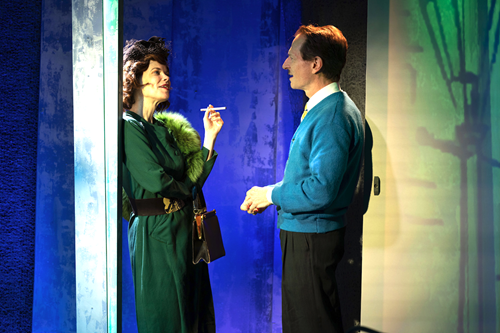
Disney, for his part, is intrigued by Leni Reifenstahl but for him, the meeting is more about showing off his studio and its craft than forming an alliance with this sometimes embarrassingly forward visitor. The scenes in Disney’s studios are cleverly conjured on stage with a series of folding flats enabling the illusion that the characters are moving from one room to another. Nonetheless, Riefenstahl persists, determined to overcome his resistance through a combination of her considerable allure and the promise of tremendous profits for them both.
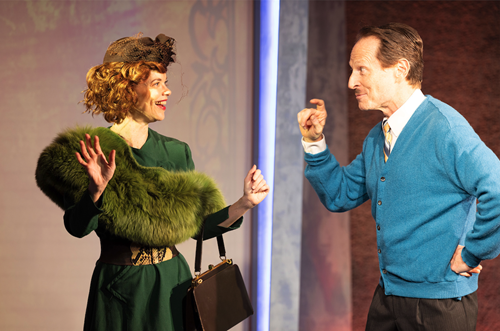
Leni’s tour of Disney studios has Walt describing in detail his plans for an animated feature that would bring such classical music opuses as The Sorcerer’s Apprentice and The Night On Bald Mountain to animated life, i.e., Fantasia, a title that, if we are to believe Crevasse, Leni came up with herself. Not only does Walt get Leni to model for the cartoon character children around the world will soon know as Pinocchio’s Blue Fairy. Playwright Jacobson gives us Walt Disney and Leni Riefenstahl in all their complexities and contradictions. (Did Nazi ideology appeal to all-American Walt? Was Leni an anti-Semite or did she maneuver behind the scenes to help her Jewish friends?)
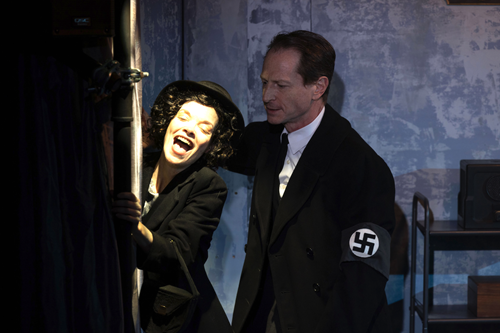
“In November 1938 there was public outcry about Germany, but full details were not yet known,” explained director McCray. “This was just after Kristallnacht, years before the U.S. officially entered the war against Germany. There is a perplexing draw toward autocracy again, so it’s important to explore issues around power, and the conflicting influences of money and ethics. In Crevasse, the comparisons between the work and ideals of filmmakers Disney and Riefenstahl provide a compelling examination of business and power through film.” Many questions remain unanswered and Jacobson’s play manages to raise those questions.
Ann Noble is brilliant as the sexy, ambitious and utterly self-absorbed Leni, a siren none too subtle in her efforts to convince Disney (a nuanced Leo Marks) to help her lock in a deal. The two filmmakers to discover how much they have in common. Not only did they both drop out of school to pursue their art, they have both created film masterpieces, albeit in different genres. (“You show the world as it is,” Walt tells Leni. “I show the world as I want it to be.”)
One of the ways Jacobson instills poignancy in this story is through the inclusion of two other (historically based) characters: Ernest Jaeger. Riefenstahl’s agent (Marx), and Jaeger’s cherished wife, Lottie (Noble), a Jewish woman who is left behind in Germany when he travels, for financial reasons, with Riefenstahl to the States. Jaeger loses touch with Lotte, surmising that she’d been seized by the Nazis and presuming, given the odds, that she’d perished. That story serves as a frame for the larger tale of Leni Reifenstahl’s visit to Hollywood.
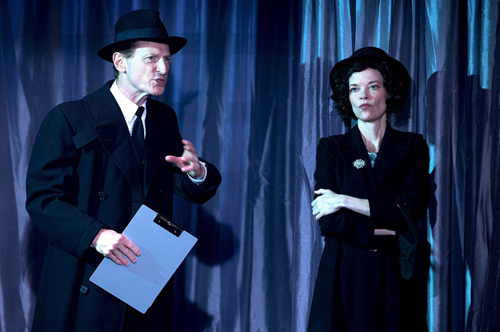
Performances of Crevasse run from July 26 through August 18 on Fridays and Saturdays at 8 pm and Sundays at 4 pm. The Victory Theatre Center is located at 3326 W Victory Blvd., in Burbank. Tickets range from $23 to $40. Seniors and union members are $25. For more information and to purchase tickets, call (818) 841-5421 or go to www.thevictorytheatrecenter.org.


